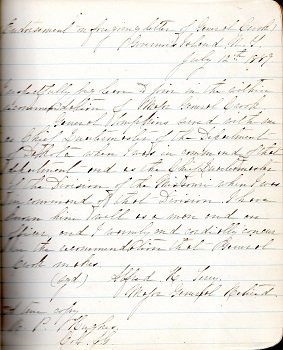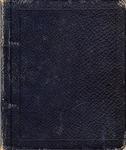CHARLES HENRY TOMPKINS – ORIGINAL COPY BOOK.

N.p, n.d. Unpaginated (approx. 120 lined pages). Black pebbled leather journal with rounded corners, a.e.g. Ownership stamp of Tompkins on the front fly and third page. General rubbing, more noticeable at spine ends and corners with a short tear at the bottom of the front cover. Overall, good+ or better.
Charles Henry Tompkins (September 12, 1830 – January 18, 1915) was born Fort Monroe Virginia. He was the son of Colonel Daniel D. Tompkins, a career Army officer. Tompkins received an appointment to West Point but left to work in the private sector. In 1856, he enlisted, as a private, in the First Dragoons and rose through the ranks. Tompkins received his commission as a 2nd Lieutenant in the 2nd U.S. Cavalry in March 1861. At the Battle of Fairfax Court House in June 1861, he charged through enemy lines twice and killed Captain John Quincy Marr, the first Confederate soldier killed in combat. For his bravery, he was awarded the Congressional Medal of Honor. Tompkins eventually attained the rank of colonel and was brevetted to Brigadier General by the end of war. He was one of nine officers on the military commission that tried the conspirators involved in President Lincoln’s assassination.
Between 1866 and 1881, because of a dispute with General Grant, he was assigned to numerous remote and austere western posts. While serving in the Quarter Master Corps in Arizona, Tompkins was accused of misappropriation of funds and charges were filed. On January 11, 1873, in San Francisco, he was tried and sentenced to suspension of rank for one year and forfeiture of all pay and allowances except for $75 a month “for an offense shown to be technical in its character.” It seems that, while he did not benefit personally, Tompkins took funds earmarked for one purpose and allocated them to one he considered more critical. After his suspension, he remained in the Quartermasters Corps and, eight years later, had risen to the rank of Assistant Quartermaster General.
With Samuel B. Holabird set to retire as Quartermaster General in June 1890, Tompkins aspired to succeed him. Aware that his court martial could hinder his candidacy, it is believed that he reached out to members of his court martial and fellow officers to mitigate its impact.
This copybook includes fifteen letters spanning thirty-three pages from these individuals, each transcribed in what appears to be Thompkins’ handwriting. The letters include endorsements from prominent military and government leaders, many of whom were connected to Thompkins’ court martial. All of them recommend him for the position of Quartermaster General. Below are selections from these letters:
George W. McCray (Judge, Congressman, & Secretary of War - January 1890): Letter to President Benjamin Harrison. “…that there was no charge, and no testimony affecting the integrity [of Tompkins]” and that he used “a small sum of money for a public purpose different from that which it had had been appropriated…the act was not without precedent, though of course technically unlawful, ….and it would be unjust to deny him the promotion because of ….anything contained in the Court Martial proceeding….”
William W. Belknap (Secretary of War at the time of Tompkin’s Court Martial – February 1888): Letter to Tompkins. “I never believed that you could properly be charged, with misapplying money dishonestly….the money was, as my memory recalls the facts honestly used for the public service….I believed then and believe now that your honor and honesty as an officer could not be questioned.”
Michael V. Sheridan (Assistant Adjutant General & Brother of General Phillip Sheridan – January 1889): Letter to President Benjamin Harrison. “….I beg the privilege of saying to you that from close [association] with the late General Sheridan. I had the opportunity of knowing the high esteem in which he [Sheridan] held Colonel Tompkins as a man and an officer, … and he considered him so efficient and capable that had not death intervened, I am sure when the vacancy occurred…he would….have placed on record the strongest confidence in the ability and usefulness of Colonel Tompkins…I have often heard General Sheridan say that he would consider the promotion of Colonel Tompkins to the head of the Quartermaster’s Department one of the most beneficial thing that could occur to the Army.”
George A. Crook (Major General U. S. Army – January 1889): Letter to President Benjamin Harrison. “I most respectfully wish to endorse in in the strongest manner the claims [for promotion] of [Tompkins] to Quartermaster General….General Tompkins served in the War with marked ability and devotion to his duties both as a Colonel of cavalry and as quartermaster, and since then in his present [role] filling important positions as Chief Quartermaster…and is thoroughly fitted and in every way competent to succeed to the important administrative position of Quartermaster General.”
Alfred A. Terry (General U. S. Army -July 1889): “General Tompkins served with me as Chief Quartermaster of the Department of Dakota when I was in command of that department and as the Chief Quartermaster of the Division of Missouri when I was in command of that Division. I have known him well as a man and as an officer, and I warmly and cordially concur in the recommendation that General Crook makes.”
David S. Stanley (Brigadier General U. S. Army in Command of the Department of Texas and Congressional Medal of Honor Winner – November 1889): “…I have known Brevet Brigadier General Charles H. Tompkins since 1848. I have known him as a Cadet, a private soldier, a non-commissioned officer and office of the line and a Quartermaster. I consider and believe him to be fully competent to fill the office of Quartermaster General of the Army by his integrity, his experience, his business capacity, and his unselfishness of character. I take great pleasure in recommending most heartily for the appointment of Quartermaster General.”
There are two other entries: one outlines Tompkins's journey to the West from St. Paul, and the other lists distances and cumulative mileage for a steamboat trip down the Missouri River from St. Louis to Fort Benton on the Key West. These records were likely written by his aide (or possibly his wife), not Tompkins himself.
Original copybooks of career army officers, especially those who are Congressional Medal of Honor recipients, are exceedingly rare. This particular copybook underscores Thompkins' concerns about his court martial impacting his prospects of becoming Quartermaster General. Additionally, it offers valuable insights into the court's perspective and reflects the respect he commands among his fellow officers.
# [beb001]


